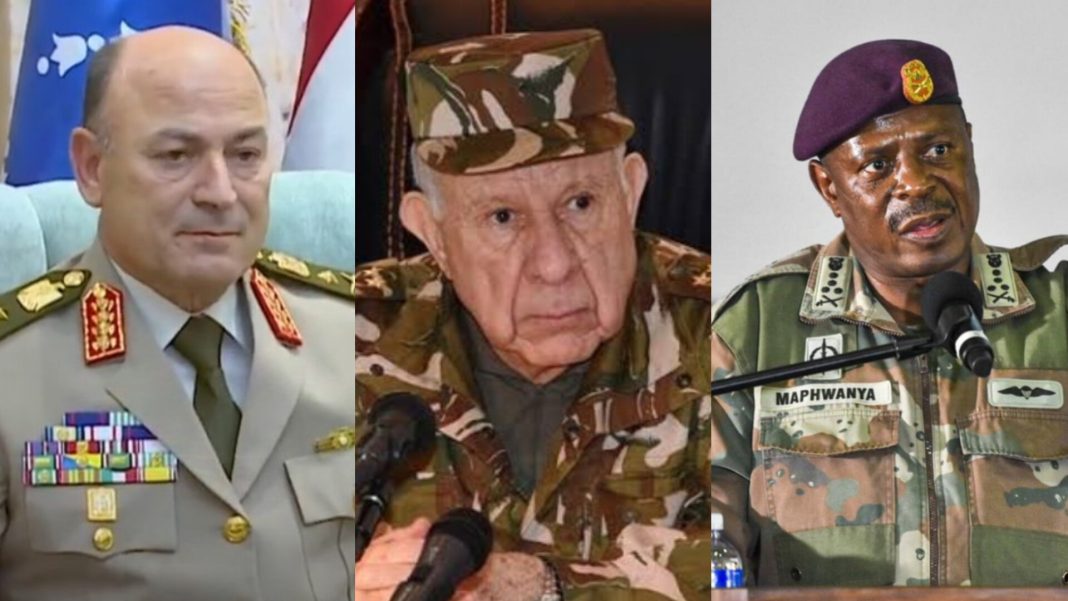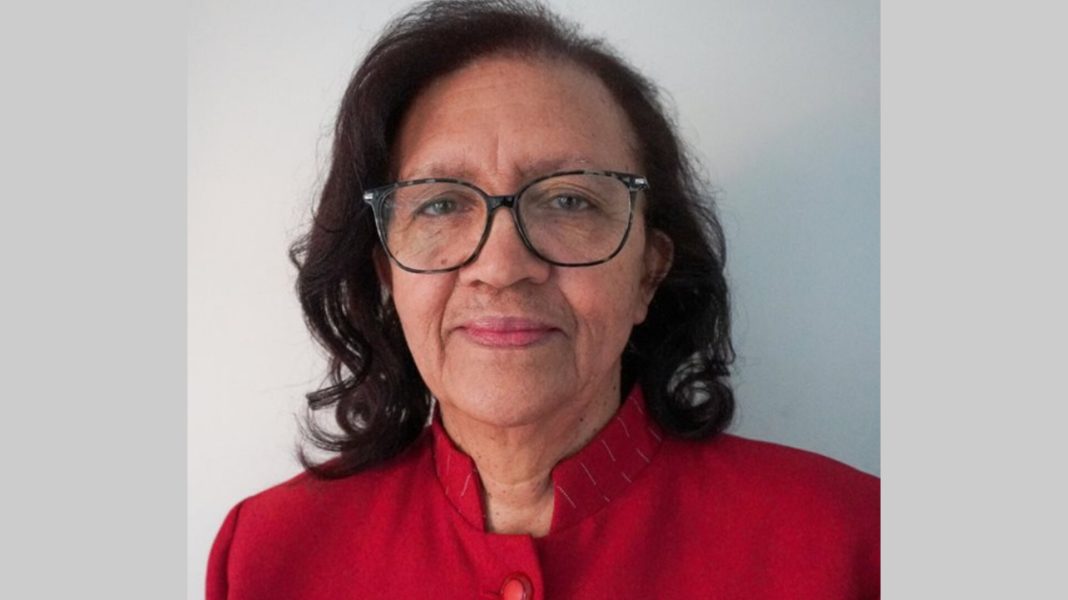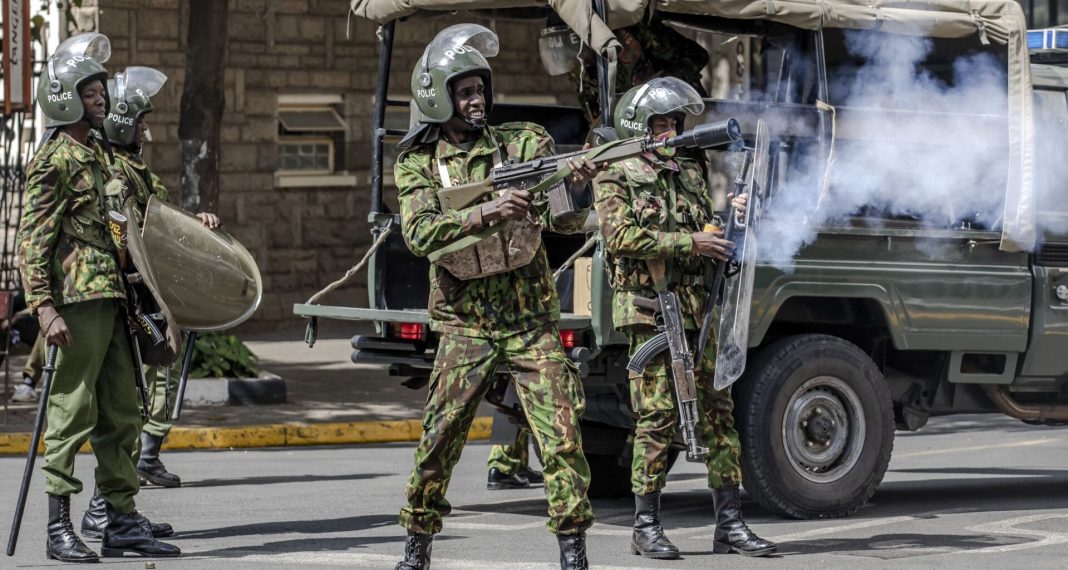In the heart of Africa, military power is not just a matter of numbers and equipment; it is deeply intertwined with leadership, strategy, and vision.
The continent is home to some of the world’s most formidable armed forces, each led by influential military bosses who shape national security policies and defense strategies.
From the deserts of North Africa to the savannas of the south, these leaders navigate complex geopolitical landscapes, balancing regional threats with internal challenges.
In this article, WoA explores the profiles and contributions of the military chiefs at the helm of Africa’s ten strongest armies.
1. General Osama Askar – Egypt
Egypt stands as the preeminent military power in Africa, holding the 15th position globally with a PowerIndex score of 0.2283.
The Egyptian Armed Forces are under the command of General Osama Askar, who serves as the Chief of Staff.
With a defense budget exceeding $4.4 billion, Egypt maintains a formidable force comprising over 450,000 active personnel and an additional 800,000 in reserve.
The military’s arsenal includes advanced fighter jets, tanks, and naval assets, reflecting a commitment to maintaining regional dominance.
2. General Saïd Chengriha – Algeria
Algeria ranks as the second most powerful military in Africa and 26th globally, with a PowerIndex score of 0.3589.
General Saïd Chengriha leads the People’s National Army as Chief of Staff.
Algeria’s military infrastructure is bolstered by a range of modern equipment, including fighter jets, tanks, and artillery systems.
The country’s vast size and its role as a leading energy producer necessitate a strong military to secure its borders and critical infrastructure.
3. General Rudzani Maphwanya – South Africa
Holding the 33rd position globally with a PowerIndex score of 0.4632, South Africa’s military is led by General Rudzani Maphwanya, the Chief of the South African National Defence Force.
The nation’s defense budget is over $4.3 billion, supporting a professional force equipped with modern technology.
South Africa’s military is distinguished by its advanced defense industry, capable of producing indigenous military hardware.
The country has been active in regional peacekeeping missions, contributing to stability across the African continent.
4. General Christopher Musa – Nigeria
Nigeria ranks 39th globally with a PowerIndex score of 0.5619.
General Christopher Musa serves as the Chief of Defence Staff, overseeing a military with over 120,000 active personnel.
Nigeria’s defense budget is approximately $2.4 billion, allocated towards combating internal security challenges, notably the Boko Haram insurgency in the northeast.
The military’s operational experience in asymmetric warfare has led to ongoing efforts to modernize and adapt its forces to effectively address both internal and regional security threats.
5. Field Marshal Birhanu Jula – Ethiopia
Ethiopia holds the 49th position globally with a PowerIndex score of 0.7938.
Field Marshal Birhanu Jula leads the Ethiopian National Defense Force, which comprises over 162,000 active personnel.
The defense budget is around $888 million, reflecting the nation’s focus on maintaining sovereignty and addressing internal conflicts.
Ethiopia’s military has a storied history, including its notable resistance against colonial forces.
In recent years, the military has been engaged in internal conflicts, necessitating a focus on counterinsurgency operations and border security.
6. General António Egídio de Sousa Santos – Angola
Angola ranks 55th globally with a PowerIndex score of 0.8702.
General António Egídio de Sousa Santos serves as the Chief of General Staff of the Angolan Armed Forces.
The military comprises over 107,000 active personnel, supported by a defense budget of approximately $3.5 billion.
Angola’s military has undergone significant modernization, acquiring new equipment to enhance its capabilities.
The nation’s experience in prolonged civil conflict has shaped a military adept in both conventional and guerrilla warfare.
7. General Abdelfattah Louarak – Morocco
Morocco holds the 61st position globally with a PowerIndex score of 1.0081.
General Abdelfattah Louarak leads the Royal Armed Forces as Inspector General. The military includes over 195,800 active personnel, with a defense budget of about $12 billion.
Morocco’s strategic location and regional ambitions drive its investment in a well-equipped and versatile military, capable of addressing both conventional threats and participating in international peacekeeping missions.
8. Lieutenant General Christian Tshiwewe Songesha – Democratic Republic of the Congo (DRC)
The DRC ranks 73rd globally with a PowerIndex score of 1.2491.
Lieutenant General Christian Tshiwewe Songesha serves as the Chief of General Staff of the Armed Forces. The military comprises over 166,580 active personnel, with a defense budget of $300 million.
Despite limited resources, the DRC’s military is engaged in ongoing efforts to stabilize the country, contending with various armed groups and regional security challenges.
9. Brigadier General Mohamed El Ghoul – Tunisia
Tunisia holds the 74th position globally with a PowerIndex score of 1.2881.
Brigadier General Mohamed El Ghoul leads the Tunisian Armed Forces as Chief of Staff.
The military includes over 89,800 active personnel, supported by a defense budget of approximately $1.26 billion.
Tunisia’s military focuses on counterterrorism and border security, playing a crucial role in maintaining national stability in a region facing various security challenges.
10. General Abdel Fattah al-Burhan – Sudan
Sudan ranks 76th globally in military strength, with a PowerIndex score of 1.4119.
The Sudanese Armed Forces (SAF) are led by General Abdel Fattah al-Burhan, who serves as the Commander-in-Chief.
The SAF’s size has varied over the years; in 2011, estimates placed personnel numbers at approximately 109,300.
By 2024, reports suggest that the SAF comprises around 300,000 personnel, reflecting significant growth amid ongoing conflicts.
Sudan’s military expenditure has fluctuated notably. In 2017, spending peaked at approximately $4.38 billion, accounting for 3.29% of GDP.
However, by 2021, expenditure had declined to about $0.38 billion, representing 0.92% of GDP.
The ongoing conflict since April 2023 has further strained Sudan’s economy, with significant funds allocated to military efforts, exacerbating hyperinflation and economic instability.
The SAF is currently engaged in a protracted conflict with the Rapid Support Forces (RSF), leading to widespread devastation, particularly in the capital, Khartoum.



